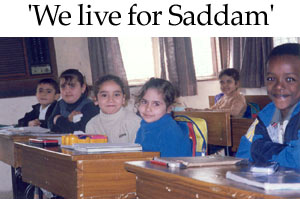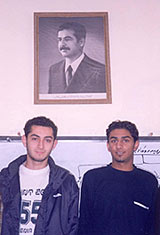Home > News > Specials
The Rediff Special/Basharat Peer
February 24, 2003

"Hello! Hello!" Saad M Jassim's greeting is cheerful as he guides you to a seat in his office. A framed picture of Iraqi President Saddam Hussein keeps vigil on the wall facing him. An Iraqi flag stands proudly outside the room. Jassim, a handsome man in his mid-forties calls for a translator. She turns out to be a lady who teaches English at the Iraqi school in Safdarjung Enclave, south Delhi.
Jassim is the principal of the school.
As you enter, you get the feeling that you have somehow been magically transported into Baghdad. All the students in the school are Arab -- most of them, in fact, are Iraqis. The teachers too are Iraqis. The books are in Arabic. Established in 1972, the multi-storied school building offers glimpses of Iraqi prosperity, long before Saddam Hussein became a 'villain.'
Jassim came to India in 2000; his family, including his son and daughter, live in Baghdad. An Arabic monologue streams through his lips, liberally peppered with English words like aggression, imperialist and America. The English teacher, a pretty, green-eyed Iraqi, translates dutifully
"An American strike on Iraq would be imperialist aggression. All Iraqi people believe that. We have faith in our president Saddam Hussein. We are ready to defend our country. The American aggression is useless," he says.
Thousands of miles away from Iraq, in this middle-class Delhi neighbourhood, Jassim knows he is safe. "The present situation has not affected us as yet. Even if the aggression happens and schools in Iraq are closed down, we will not close our school. Our teachers will continue to teach," he says.
The school is run by Iraq's education ministry. Like other Iraqi schools, education here is free for Iraqis, while non-Iraqis pay a modest fee.
He sips from a steaming hot cup of aromatic Iraqi tea, which has now been placed in front of us, and leans forward on his chair. His voice and demeanour become intense as he talks of the "evil designs of America" against the Muslim world.
"America wants to capture Iraq and then the whole Islamic world. It does not only want the oil, it wants full control." His face grows red with passion. Though he wants to keep the school running, he says he will not think twice about going back to Iraq to fight the American forces, if need be
"If I have to, I will became a fidayeen [suicide bomber] for my country," says Jassim, who has been keeping in touch with his children via e-mail and the phone. He is an angry man. And he is very worried. Worried about his country. Worried about his children.
Across the corridor from his office, students recite lessons in Arabic. The alien language and the rhythmic rise and fall of their words lends a melodic feel to what may be a drab school exercise.

English teacher Maha-al-Hadifi enters the classroom. The students here, she tells me, belong to the fifth standard. As soon as they see her, they stand up and greet her in Arabic, "We live for our leader Saddam." The 10 and 11 year olds then sit down and stare at me from their wooden desks. They can't help giggling.
"We live for our leader Saddam." This is the greeting you hear every time you enter a classroom in an Iraqi school.
"Saddam Hussein is the best leader," says Mohammed Abbass, who has just finished his twelfth standard chemistry class. A framed poster of Saddam Hussein hangs above the blackboard. Abbass' father is a researcher at an engineering college; Abbass is preparing for a medicine school in Iraq.
Abbass says he prefers Iraq to any foreign country. "It is better for me there. My friends and relatives are there. It is my country," he says simply.
Abbass, all of 18, finds the American plan to attack Iraq "disgusting." At the same time, he feels helpless. "What can I do? I wish I could do something about it. If I were there I would fight. But I am here and have to prepare for medical school."
Other Iraqis, like the robust Khalil Ibrahim, 31, are all set to return. He exports wood from India to Iraq. "Indian wood is in great demand in Iraq. But, since the talk of war has started, my business has collapsed. There is no work now. I am leaving for Iraq," he says.
Ibrahim, who lives near an armament factory in Baghdad, dreads the war. He has witnessed the destruction wreaked by American bombs during the Gulf war. He cannot forget how buildings were destroyed and how people died. He has even seen children getting killed by the Iraqi shells that littered the streets of his city.
Still he wants to be home before a possible war begins. "Even if I am not fighting in the army, I have to go home. My wife and two sons are there. I have to be with them," Ibrahim says. He believes the Americans will bomb everywhere, including residential areas. "That is what they did earlier," he says.
For him, and for other Iraqis like Jassim and Maha, America is a nightmare that refuses to go away. "America calls us terrorists," says Ibrahim, "but it is the biggest terrorist."
But younger generation of Iraqis, like tenth standard student Mohammed Sabah, can see the difference between the Bush Administration and the Americans. He says he does not have American friends since he has never been to the United States. But he has seen the anti-war protests that are taking place in America on television. "Thousands of Americans were rallying against the possible war on my country. They were good people; they could be my friends," Sabah says.
Otherwise, he is like any other teenager. He likes Western music, fast food and movies. He prefers Nikes and Levis to traditional Iraqi dress. He even celebrated Valentine's Day. "Just with my friends!" he grins. His father is a businessman in India. Sabah, who has been in Delhi for the last five years, says likes the city "a lot."
The rest of his family is in Iraq and he is worried about them. His bitter anger against what America is doing to his country comes as a sudden shock. For the teenager talks with the conviction of an ideologue. "We are not scared of America. We are angry. I want to go back and fight," he says, as he clenches his fist and looks directly into your eyes.
But there is no time for the anger to boil over; it is time for his mathematics class.
Jassim, the principal, is waiting at the gate to bid me farewell. He repeats his assertions on Saddam Hussein's "greatness" and a possible American "aggression." The English teacher, once again, dutifully plays the role of translator. Jassim opens the gate for me, shakes my hand. This time, he does not take Maha-al-Hadifi's help to bid me goodbye. "Hello!" he says with a smile and a wave, "Hello!"
The Rediff Specials